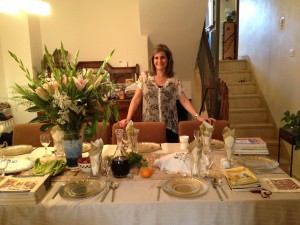 The run up to this year’s Pesach Seder included a remarkable – and decidedly disturbing – discovery: no one in our family really likes Pesach. No, it was worse. Some of us really hatePesach. The preparation, the cleaning, even the Seder itself doesn’t rank highly on our list of peak Jewish experiences.
The run up to this year’s Pesach Seder included a remarkable – and decidedly disturbing – discovery: no one in our family really likes Pesach. No, it was worse. Some of us really hatePesach. The preparation, the cleaning, even the Seder itself doesn’t rank highly on our list of peak Jewish experiences.
How could this be? Everyone likes Passover, right? After all, it’s the holiday that nearly every Jew observes, in one way or another. In Israel, 82 percent of Jews who self-identify as secular still attend a Seder. And, of course, 100 percent of self-identified religious Jews find themselves reciting the Haggadah. Were we alone in doing, but disliking, the holiday? Or are there closet Seder haters like us?
The truth is, this is not the kind of news you want to blurt out. It’s like saying “I know you’ve been eating in my kosher home for years but I forgot to tell you we serve bacon on our milk dishes.” (That was an example only, OK?) So I didn’t do any kind of anecdotal surveying of friends and family.
Still, given the sensitivity and timeliness of the topic, we had to do something to address our apparently pent up holiday frustration. So I sat down with other family we had plans with this year for Seder and I shared our story. While their situation wasn’t as dire (their kids are both under three; they haven’t had time to move past the wonder of getting through the first verse of Ma Nishtanah to the cynicism of “you can stop at the wicked child”), the father admitted something I’d never considered.
“You know,” he said without blinking, “we don’t actually say all the words. We skip most of the Magid.” (The Magid is the meat of the Haggadah, which is recited on Pesach; it tells the story of the Exodus from Egypt and is full of one-upping rabbinical scholars explaining why it wasn’t 10 plagues, it was 50, no it was 250!)
“Skip the Magid,” I thought. Is he crazy? That would be in the same category as the aforementioned fictional bacon. Or…would it?
After all, we are a pick and choosing kind of people. Most of us in observant and quasi-observant communities might be loathe to admit it, but we don’t do everything as prescribed by Jewish Law (as if that were a universally agreed upon, non-moving target in the first place). And sometimes where we draw our lines has more to do with, gasp, convenience, than a higher purpose.
Who says that if you leave out a section or two (or three) of the Seder, you haven’t fulfilled the commandment of seeing yourself as if you personally left Egypt? Rabbi Aryeh Ben David, who runs Ayeka, an organization he calls a “Center for Soulful Education,” sent out a pre-Passover email. The headline of one section was Don’t Teach – Evoke.
“The Seder is not a learning event,” Ben David writes. “If the rabbis had wanted us to learn, they wouldn’t have asked us to drink four cups of wine (they weren’t talking about grape juice). We have 364 days of the year to learn about the Exodus. The Seder is an experience to evoke our hearts and souls.”
He gives further instruction to Seder leaders: “Please do not metamorphosize into the ‘Rabbinic Scholar’ for one night a year. Your job is not to preach and impress everyone with your erudition, but to create a safe space for others to share.”
Now, I know Aryeh Ben David and I’m sure he wasn’t suggesting we drop the text entirely, but with his implicit permission, we mixed it up more than a little bit. Moreover, we went with the flow.
When the 2.5-year-old at the table started signing Ma Nishtanah out of order, we just went with it. Ditto for Dayenu. We hadn’t even gotten to the 10 Plagues, but if it was time to say “That would have been enough!” so be it. Sometimes we circled back, making sure not to miss something we all found meaningful; other times we plowed ahead, picking and choosing our texts on the fly.
We talked about change and freedom and hit all the major topics. We staved off hunger by feasting on meaty artichokes instead of parsley for karpas, and the hard-boiled eggs arrived before we’d slathered maror on charoset in a Hillel sandwich. At one point we turned the floor to Safta to tell some corny Passover jokes. (If a doctor carries a black bag and a plumber carries a tool box, what does a mohel carry? A briskit!) And despite our jumping past chunks of the Haggadah, our Seder still ended at close to 1:00 AM.
Our freeform Seder was anything but traditional and yet it was probably more authentic than the rote recitation we’ve done for so many years. Because by opening up to being in the moment, as one text we used from our Jewish meditation teacher suggested, to not knowing exactly what was coming next, we felt truly liberated. And isn’t that the main message of Passover in the end?
This post appeared previously on Israelity.

